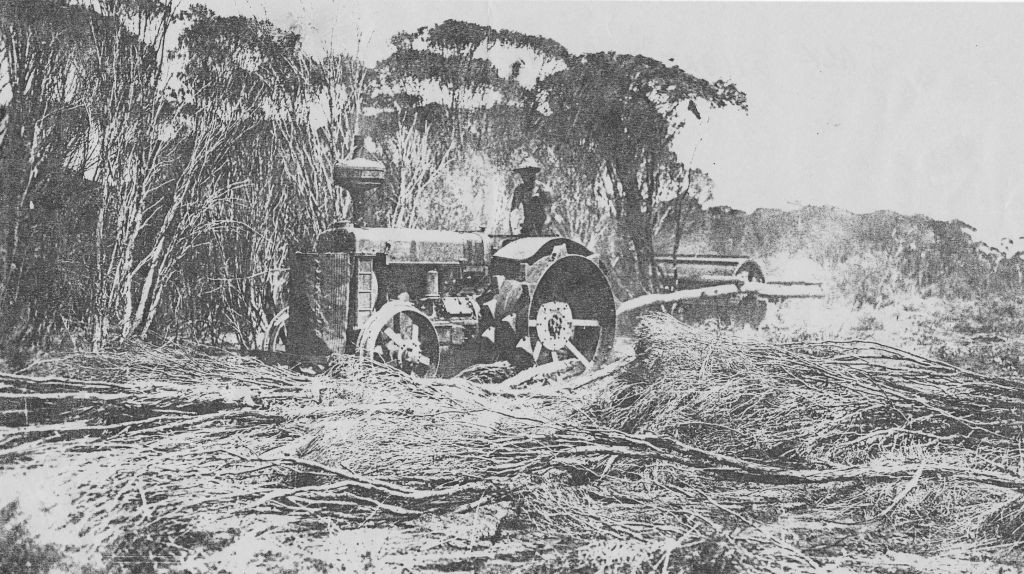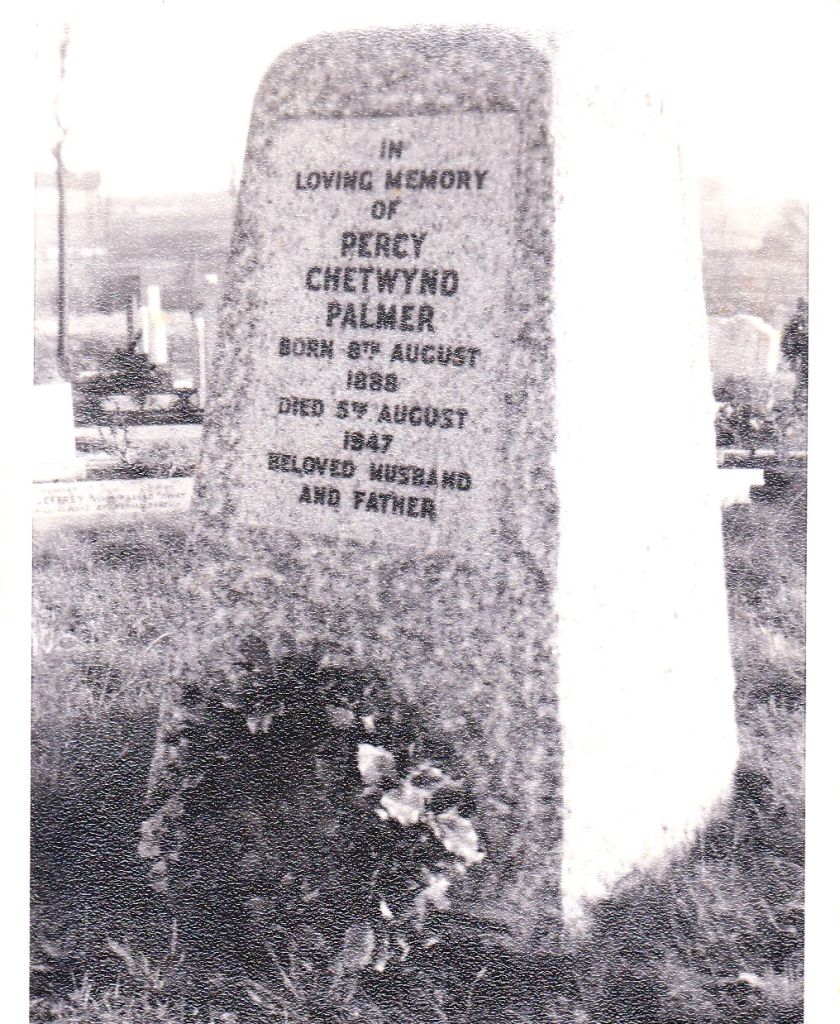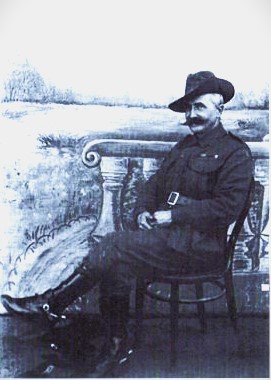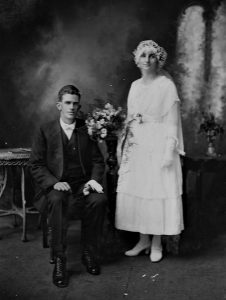March 2nd 1927
Tenindewa Notes (From our Correspondent)
As the only humming to be heard now comes from the busy bees I presume harvest is all finished. I think, without boasting, that our district before long will be up among the highest producers in the state. Even now we will take beating. Time after time you have read from your different country correspondents of great yields of grain this year, but to my mind the Minister for Agriculture, Mr. M. F. Troy, has shown that he knows something about the department he is king of, by producing 4600 bags of wheat (383 tonne) from 600 acres (240 hectares). In one particular paddock he stripped fourteen bags to the acre (2.4 tonne per hectare). Although this I think is the best in our districts, the most credible yield was from Mr. Tom Moore’s farm at Indarra, 1884 (157.5 tonne) bags of wheat from 300 acres (120 hectares). As Tom nor Bob Moore are any relation to the Rothchilds, they were accordingly handicapped in their first kick-off as farmers. If ever a man deserved reward for his labour it was Bob Moore. Work was the only mate Bob appreciated and stuck to, and I am glad to hear he was well recompensed.
On the 15th of February the Westralian Farmers (Wesfarmers) gave a tractor and the latest agricultural machinery demonstration at Messrs. Nat and Alex Rumbles farm at Tenindewa. It was a great success from both the farmers and the agent’s point of view, Mr. Logan being kept busy booking orders. So impressed was Mr. H Stafford with the plow that he gobbled it up at once and for the way the Horward Bagshaw cultivator did its work, the many orders booked vouched for that.

Identifiable persons: Norm and Les Ullrich (back row centre) Their father Harry (right) and Harry Stokes (front row right)
The “cocky” just now is the whitest snoozer in the world. The elections are coming on and what the
aspiring candidates are not going to do for our welfare cannot be told, so what with the Nationalist, United, Country Party and Labourites are telling us what they will do if we only give them the handling of that 600 pounds a year ($1200.00) we are wondering who will give the best Santa Claus. Personally, I wish it were over, and then the successful one could send us some rain, for the weather lately has been abominable. I read in notes from your Upper Chapman correspondent a complaint about the cornsacks sold to farmers and that in spite of cramming, ramming slamming and jamming it was impossible to put put 180 lbs (86 kgs) of wheat in one bag. [A bag of wheat was expected to be and paid for on the condition it was 3 bushels ie 3 X 60 lbs] I will go further and while fully agreeing with him, I ask why should any farmer have to resort to such tactics? The best thing to do is summons the jute merchant for obtaining money under false pretenses because the farmer orders and pays for a three-bushel bag. He generally receives a two or two and a half one. If a baker sells a loaf of bread one-ounce short weigh he is fined 10 pounds ($20.00). What applies to him ought to apply to all vendors. Though the “cocky” has been a target to be shot at by everyone for years, as sure as bad eggs make good bombs, he will wake up and get his own back.
I don’t know whether this rumor can be verified, but it is said that the Mullewa Roads Board are going to borrow 3000 pounds ($6,000.00): declare Mullewa a Municipality, pull down the barn they use for functions, erect an up to date Town Hall, install electric lights in the town, let the present offices [out] and it in future make Mullewa what she deserves to be—one of the most progressive and up to date country towns. Yes, the time is now opportune for Dave Warren to don the Mayoral robes.
March 19th 1927
Tenindewa Notes (From our own Correspondent)
We had over four inches of rain (100 mm) in two days, the creek came down a banker, and a portion of the Bindu Road was washed away at a point where the Public Works gang tried to deviate a chain wide (20 metres) stream into a six foot cutting on a turn, a piece of smart engineering and a waste of money. A motor came to grief in this washaway and stayed there for two days. It is on the main Geraldton-Mullewa road and other motors would have been held up only Mr. Stafford opened his fence and allowed them to go through that way. [Interestingly records show that Tenindewa had almost 102 mm for for 2 days mid March…….it shows once again that any recordings reported under the pen of “Our Own Correspondent” alien exactly with 08120 Tenindewa’s official gauge??]
It is raining again today and looks like continuing. It is holding up a lot of clearing work.
Still another tractor has arrived. Messrs. Rumble Brothers having received a Case.
One of our bachelors have found a wife, Mr. Alec Butler recently being married in Perth to one of our one time school girls. We wish them ever health and happiness: they deserve it. [Alec married Miss Olive Stone]
Mr. Stafford has just had a well completed 74 feet deep (25 metres) giving a good supply of nearly fresh water. It will carry 2000 sheep or more, and is good for all stock. This is the third well he has found on his property.
Tractors will revolutionize scrub rolling and farming around here. They do very satisfactory work, and quickly.
We put in 30,000 bags of wheat to our siding the past season and I guess it will be much larger next if it is fair season, as much new ground is cleared.

March 19th 1927
Tenindewa Notes (From our Correspondent)
The Mullewa Magnet & Perenjori-Morawa Advertiser
Unfortunately, I have to record the death of Mr. Patrick. Butler, a resident of this district, who passed away last week.
The late Mr. Butler lived here for the last 7 years and it can be truly said that he did not make one bad friend. He was liked and respected and genuine expressions of sorrow were the order of conversations among friends when the sad news of his death became public.
Only a month before that we sustained the loss of another of our old friends, the late Mr. Percy Palmer, who had lived here for a good number of years and was respected by all.


At the time of writing we are enjoying nice cool weather and quite a number of farmers have commenced to prepare for the coming seeding, and super arriving with every goods train and being promptly unloaded, enabling the Railways to hurry the trucks back to the works for reloading. Without super supplies, farming land here would be valueless, and we will someday realize just how much we are depending on the other fellow, for after all the working man is a producer equally as much as the the farmer, and that the real enemy of the farmer is a non-worker, who will stir up strife and misunderstanding between the two sections of the producers and indirectly is the cause of the unpleasantness now existing between two prominent political parties.
JUNE 17TH 1927
Geraldton Express (From our Correspondent)
Tenindewa Topics
As the Royal Visitors had not time to come and see me I had therefore, to make time and go and see them. That is why I have been so long winded with my notes this trip.
Some farmers are finished and some are on their last lap for seeding operations. Tractors , every design ever invented, have been puffing and blowing, skidding and bogging around this district. I think there are more Cases than others, but whether they are better is an open question, though Mr. W. H. Stokes can always be retired upon to state a case for the “Case.” Our old friend Mr. Henry Ford, beg pardon, I mean Mr. Henry Stafford, is very proud of the performance he put up with his Case tractor. He pulled into a paddock of about 120 acres [45 hectares] at 10 o’clock on Monday morning, ploughed it, then drilled it (no sunder seeder) and came out of the paddock with the tractor at 5 o’clock on Saturday night. Not bad going for a young colt–sixty four years of age is it?
I have heard enough about the comparison between horse power and tractor that I don’t want to hear any more. Which takes the belt is still an argument, but this much I say, as a sleep disturber a tractor is out on its own especially when owned by a cocky, who to make sure of his crop for his second payment tries to reap Edison’s reward for ‘perpetual motion’ by continuously working day and night. I don’t know what the Trades Hall people are doing for allowing such a machine to come into ‘eight hours a day Australia.’? There is one thing about it, one can get one’s seeding done in ample time to catch the rainy season. There are some big areas under crop here this year, Brenkley Bros, 900 acres: W. T. Curtis, 460: A. E. Benoit, 360 acres: R. W. Johnson, 350 acres: J. J. Smith, 360 acres: R. Dunkin, 1000 acres: Bob Oldham, 800: Rumble Bros. between 500 and 600 acres, while our new settler, Mr. Ullrich has from here to Meekatharra under crop. The lord only knows how many thousands of acres he has seeded.
The proudest man in Tenindewa is Mr. Bob Oldham, as his wife has just presented him with a fine bouncing baby daughter,
I am very sorry to have to inform you that we have lost our young energetic lady school teacher. Miss N. Shier. This young lady made a host of friends here, in fact her genial personality would get her friends anywhere and though she goes to college to further her education I am sure this district will not forget the way she studied and worked for the education and welfare of our children. Miss M. Costello, from Perth, succeeds Miss Shier as the lady teacher here.
A little joke Mr. Editor about lady teachers, I must relate to you as it occurred here. A young lady from Geraldton came up here to spend her holidays with farming friends. The farmer has employed a dashing imperial officer of no mean rank. He is a bally captain, so he is. The captain’s great weakness is the fair sex. A pretty girl, and the captain is “set.” Well the farmer took all hands for a joy ride to Mullewa, his wife and two ladies (including the Geraldton one) in the back seat and the captain in front alongside himself at the wheel. Quite accidently the captain puts his arm around the back of the seat and somehow manages to grasp the hand of the young lady behind. She being a wag let him hold her hand for a while, then as quickly as lightening grabbed the farmers wife’s hand and put that into the captain’s and for twelve miles it rested so. The captain still thinks he was playing handies with a different person than he really was.
A meeting was held at Tenindewa to try and get the Education Department to re-open the Tenindewa school, as the required number of children can be obtained without calling on Mr. Bob Oldham. It won’t be long before the school is a going concern again. I wish the Mullewa Road Board would motor down and see if their “motor” could jump the washaway in our main road to Bindu. Someone will turn a “sugar- doodle” in it yet and look out for damages.
Though we have had fair rains, the cold ground is against speedy growth of crops, so there’s nothing sensational yet to report, but bide a wee.
27TH JULY 1927
Mullewa Mems (Daily Telegraph and North Murchison and Pilbara Gazette)
The Rev. B. Pratt found himself in rather a strange predicament on Sunday afternoon. Having made arrangements to hold services and to baptize the infant daughter of Mr. and Mrs. Robert Oldham of Tenindewa, he received a massaged shortly after morning service, to the effect that Mr. Turnbull, of Twin Peaks Station, had died and to journey out to perform the last rites for the dead. However he overcame the difficulty by keeping his appointment at Tenindewa and baptized Rita Gwendoline, and holding holding service in the school room, afterwards having tea at the residence of Mr. Oldham. He then returned to Mullewa to hold evening service at the Anglican Church and immediately afterwards left for Twin Peaks by motor.
Note; Bob Oldham farmed immediately west of the Tenindewa Town Reserve and lived initially on the south side of the creek about 2 kilometers west of the Tenindewa Store which is where this event (as above) took place. Sometime post that time (in about 1940) his house was set alight by a young lad from the Tenindewa Village while the Oldham’s were away. Mrs. Oldham (Gwen) was daughter of Percy Palmer.
Robert, Gwen and Rita Oldham left Tenindewa in about 1951 and returned to Victoria

Gwen Oldham (right) with Kevin, Mary, Geraldine and Tony Critch (Indarra 1955)

Robert and Gwen Oldham on a very special day
July 28th 1927
Geraldton Guardian (From our own Correspondent)
I am sitting down writing these few notes (mostly about the cockie of course), I can hear the birds joyfully singing, hailing the new day, after the rain. The butcher and the magpie are the best of singers with no charge to hear them. It is one of the compensations for living the wild and wooly life of the mulga. Still there are others. For instance, the pleasure is seeing the new ground turned over with the nice brown folds and sweet earthly scent, and to know we shall some day return to this good old mother soil. What would be better. I would sooner do that than play a harp all the time. I have no ear for music. If it was all birds, flowers, and fields with a little of Kelly thrown in I would not mind such a heaven.
Things such as wheat crops and stock are looking remarkably well and wholesome, and a great deal of foundation is already laid for an abundant wheat yield, hence plenty of spending silver for cockie and a good time for business people, especially the bane of a farmers life — the machinery agent.
There is lots of talk of more tractors. Where on farmer (or fool) leads there is always another, so the tractor will come, and after the tractor the experience, the language, etc.
Bindu School held a social and dance last Saturday evening. It was largely attended, and most enjoyable evening spent, and about 5 pounds [$10.00] was raised to spend a basketball set for the school. I understand a number of schools have been challenged to a game, and Geraldton in particular. I’ll put my bit on Bindu. They are fine kids. The teacher is Miss Costello who is a real live wire, and comes here with a good reputation as a teacher and sport, and I am inclined the boys think she is very nice. So do I.
The wild flowers are early this year and are looking very nice.
Note; In the on going search for evidence to connect “Our own Correspondent” to Leo Critch it is noted reflecting in the above on the afterlife and of mother soil. He has not reported for the previous 4 months and at the time article was written his wife May (Mary) was on her deathbed in West Wyalong NSW. She died just 8 months after the above was written and interestingly his own mother was Annie Kelly.
OCTOBER 15TH 1927
Geraldton Guardian
(From our own Correspondent)
There has been a lot of talk about rust in the wheat this season. I have been around a few crops about Tenindewa and there may be a trace on the flag, but nothing to hurt. Along the Wongan line it looks okay. Other crops don’t look as good as around this part. I saw Mr. A.E. Benoit’s crop a few days since, and it looks good enough to go nine or ten bags to the acre [2 tonne per hectare]Merredin variety will be ready to strip in about 10 days, and should yield very well. I anticipate a record harvest around Tenindewa.
A number of farmers are asking why Superphosphate Works are not built at Geraldton to supply the wonderful Victoria District with wheat manure. This would enable the railway department to deliver it in time and save an awful lot of truck mileage, and would make it possible for railways to handle the traffic decently. If super is to be stacked for a couple of months it becomes hard and costs pounds to fine it up again and it does not drill evenly.
Another question we are asking is why our wool still has to go to Perth to be sold. This extensive district produces enough wool to bring the buyers to Geraldton. It is the policy of the present Government to decentralize, so they should move on this. It would save a lot of haulage by trains and give a lot more labour in Geraldton and make it the City it should be. Wake up Geraldton! You have more time than the Cockie to battle the thing through.
I wonder would the Commissioner for Railways consider the matter of a flat rate for fire-wood, say between Northern Gully and Mullewa to Geraldton. If this was done, hundreds of tons of the best firewood could be sent from this district to warm the hearts of old Geraldton. It could be carried at railway convenience. Now Geraldton, play less bowls and see to these things please.
A social and dance was held at the Tenindewa School last Saturday and was a good success, the proceeds being for a Christmas Tree for the kiddies.
If train passengers want a feed they should not go Wongan line way at holiday times. One car on to feed many passengers and I got my tea at supper time. You want real patience on that train and be sure to take a belt with you so that can take a hole up after each waiting hour.
Arthur, Beryl and Bertha (born 1916) Benoit. Taken about 1922

OCTOBER 19TH 1927
Tenindewa Notes (From our Correspondent)
Huge Areas And Forty Bushel Crops
This part of the world will soon be starting to gather its contribution of bags of wheat towards the prophesied yield of 35,000,000 bushels for Western Australia this season, and believe me, our consignments will be greatly appreciated by the Agricultural Department. I don’t know whether you are aware that Ogilvie, per medium of the “Primary Producer” threw out a challenge to any other district to produce more wheat than they for the next three years. Yes, they did, and when I read it to some of our farmers, six of them broke their legs in the scramble to get to the telephone first to accept it. Anyhow, Mr. W.H. Stokes duly fixed up the competition so you can save your sympathy for Ogilvie. It’s a cake walk for us.
We were thinking, though, that it would be mean or unfair of us if we took advantage of Ogilvie should they be troubled with Red Rust, as we hear the pest is floating around, and we won’t close on Ogilvie’s deposit should they wish to withdraw. We are not trying to “put the wind up anyone”, but we have some magnificent looking crops. Mr. McGregor, of Menang and the consistent Mr. Tom Couper have crops which to look at will yield (bar any diseases stepping in) 40 bushels to the acre. (2.6 tonne per hectare)
As for oats. the Minister for Agriculture [Mr. M. F. Troy of Indarra] has the best crop, as one farmer said, in the world. Not personally known [to me] Mr. Ulrich, (sic) our new settler, irrespective of any adverse comment, I must say he must be a good asset to this country. He has in crop this year 3,000 acres (1200 hectares) has cleared 2,000 acres (800 hectares), and at present time has five machines, three tractors and two horse teams peeling off his grain. To my mind, everything is going well, in three years’ time Mr. Liebe will be running second.
Another new settler stirring things up around here is Mr. Joe Major, who has 800 acres (320 hectares) of crop this year and contemplates putting in 1,200 (480 hectares) next year. He has just taken delivery of a Case tractor, with which he intends to take his crops off, then roll the county down for miles. We old drones will have to be injected with monkey glands if we want to keep pace with this sort of individual. Most certainly there are any amount of old settlers with large areas under crop, so understand I am not quoting the above two in sarcasm, but only crediting them for their energetic work.
[Joe Major farmed immediately west of Indarra]
I have read where exception has taken to the “cocky” driving in a motor car. Why shouldn’t he? Is he not entitled to it? Mr. Editor, a motor car to a “cocky” is part of the equipment of his farm, and saves him no end of time in running to the siding instead of taking the old dray. Listen! I will wager there are more motor cars owned by the parasites who live by the sweat of the “cocky” than owned by the “cockies”.
I have also read where Mr. Sutton said that the Red Rust that was appearing this year was not harmful, and further more, that Nabawah [sic] wheat resisted it. I am game enough to say he is absolutely wrong in both cases.
We have a farmer in our midst who is curst or blessed with wild radishes. Whether they are a pest or an asset is open is an open question with him, for this reason. Last March 600 hungry sheep were brought from Geraldton, grazed on 100 acres (40 hectares) of radishy ground, and in September, when they were sent to Midland Junction, they topped the market. On Kurrajong’s (“Sunday Times” writer) assertion, and he is the best agricultural authority in W.A., land that will carry one sheep to the acre is worth 5 pounds ($ 10.00) per acre. The radishes are carrying six [sheep per acre] for a certain period. Silos would help through the dry period. Mr. Stafford has put another 600 into the same paddock, and as these don’t look like they have been fed on strawberries and cream, it will be interesting to note their condition after the radishes blow their bags out.
Mr. Dan and Jerimiah Kemp* are jubilant over locating a good supply of fresh water on their Bindu farm, after recent failures of many other triers.
Mussolini, the Italian statesman, has not decided which one of four farmers at Tenindewa to appoint Italian Consul, as the whole four merit the position for the way they have studied the welfare of their country.
Tenindewa shortly is going to declare a day’s holiday. Shops, post office etc. will be closed as Mr. W. Griffiths, our local shopkeeper is to be married. As Billie, as he is well known, is one of the popular men in the district. I am sure everyone will end him best wishes for his future happiness.
Bill and Ivy (nee Stafford) Griffiths (October 1927)

William and Ivy Griffiths Wedding
NOVEMBER 12TH 1927
Tenindewa Football
Tenindewa Surprise
On Sunday last Devil’s Creek team were at home to Tenindewa, when the visitors registered their first win for some considerable time. Tenindewa have several new recruits and should be well in view this season
The scores from the above have not come to hand but we understand that Devil’s Creek were absolutely outclassed
Tomorrows matches will be
Rovers v Creek at Creek
Railways v Tenindewa at Tenindewa